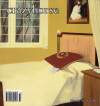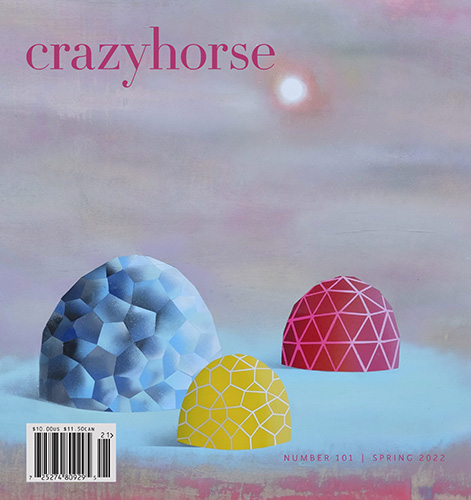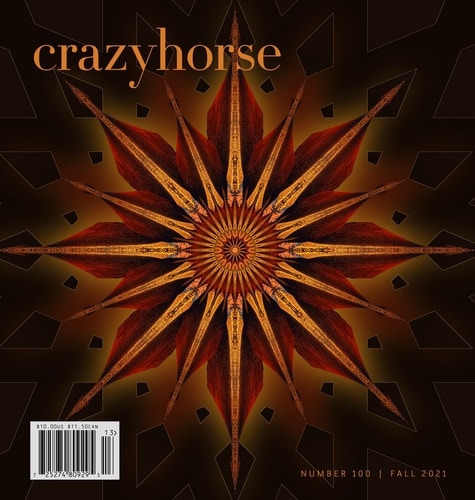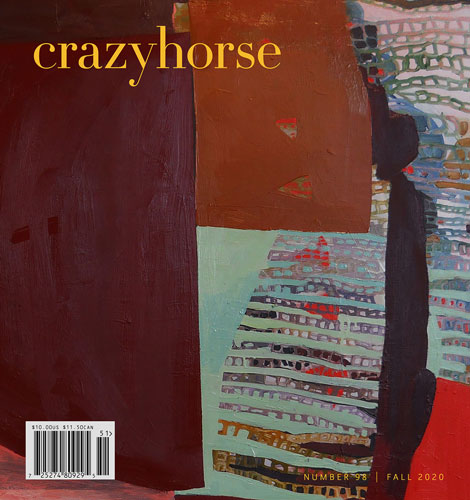The latest issue of Crazyhorse has everything we expect from the best literary magazines, from familiar authors’ names—then those same authors delivering in expected and surprising ways—to previously unknown writers delighting with the same energy as those more widely known. I even learned a few things, seeing new ways to break and enjamb poetic lines, and new ways to use space and silence and sequence in verse and prose.
The latest issue of Crazyhorse has everything we expect from the best literary magazines, from familiar authors’ names—then those same authors delivering in expected and surprising ways—to previously unknown writers delighting with the same energy as those more widely known. I even learned a few things, seeing new ways to break and enjamb poetic lines, and new ways to use space and silence and sequence in verse and prose.
I’m always grateful to come across a new Hadara Bar-Nadav poem and finding this issue opening with her work was a faithful sign that this Crazyhorse would be a stunner. I look forward to Bar-Nadav’s poems because I have an expectation I know will be met: that they’re going to entertain me in a voice, subject, or approach I could never have predicted. The energy and delight of her poem ”Thumb,” which won the journal’s Lynda Hull Memorial Poetry Prize, kicks Crazyhorse open, and that energy continues for 160 more pages.
This being the prize issue, readers also will be moved by the winners in prose: nonfiction prizewinner Jesse Donaldson’s “Notes from a Congregant,” a thoughtful examination of fandom, following the author’s obsession with the San Francisco Giants, and fiction prizewinner Jill Rosenberg’s gorgeous story “The Logic of Imaginary Friends,” in which a single mother sends her 11-year-old daughter to sleepaway camp and, on the first night, the mother’s imaginary friend from childhood returns to see her through the loneliness.
The prose field returns to sports in the tender short story of brotherhood found in John Matthew Fox’s “Down on the Pitch,” in which two brothers on a religious rugby team get the spirits beat out of them along a missionary tournament tour of Australia.
Another tough and touching story of conflicting masculinities is Dana Fitz Gale’s “Jester.” While both of these stories burst with gritty competition, Gale sets the battle in a carnival between a jester barking insults from a dunking booth and a softball-throwing young veteran on an awkward outing with his children. “It’s harder than it looks to hit that bullseye,” a character states, but Gale she keeps the story right on target.
“Biography is tyranny,” Richard Terrill writes in his lyric essay “Who Was Bill Evans?” but he proves that memoir can be anything but boring. Beginning with a list that reads “START here,” that is broken at item 17, the essay is a sequenced synopsis of jazz, poetry, confession, interview, rumor, and conjecture in sections that bounce around like the subject’s music and journey only to return to the list, picking up with items 18-30 fourteen pages later. Terrill’s essay combines the best attributes of the lyric essay: journalism and poetry.
I mentioned the issue begins with Bar-Nadav’s poem “Thumb,” in which she positions us holding “a chopstick / in the language of still-twitching fish” and shows us “what it is to be human.” Isn’t that what we hope to be shown in all poetry, what it is to be human?
This issue of Crazyhorse is thick with that poetic illustration. We’re privy to a poignant dialog during “First Contact” by Jon Davis, in which an interview subject’s responses reveal a wider wisdom, wit, and understanding of the interviewer’s questions, exampled by “What is the name of the language you speak? / Only the enemies know, and long ago we made a pact not to speak of it.”
Matthew Hittinger, another poet of whom I was previously a fan, also surprised me with his poems—two of which, “Caliper Owl Thistle Fork” and “The Sphinx * The Asterisk,” challenged my conceptions of line breaks and phrasal breath, spacing, “asterism,” and taught me new things about poetry while, at the same time, entertaining me.
But it was “Marriage An Animal Language” by Gabriella R. Tallmadge that had me typing out the poem to email to friends I knew would love it as much as I did. It’s one of those poems I’d like to share here in its entirety, but I’d rather tease you with its first stanza, hoping you’ll investigate and find the rest on your own:
When we touch it’s animals.
We live in dens, snouts and ends
in the dirt. We frog-eared,
we lick the black off plums.
This journal has such luscious metaphor and more. But explore all the profound poetry, fiction, and nonfiction in this Crazyhorse prize issue; it’s one of those rare cases where everyone’s a winner.
[crazyhorse.cofc.edu]




